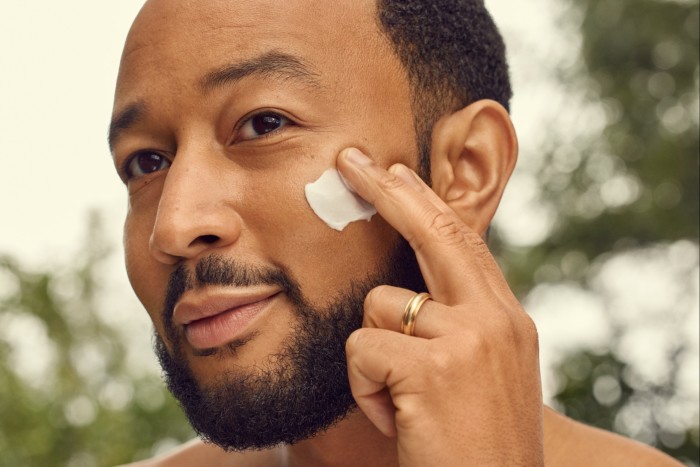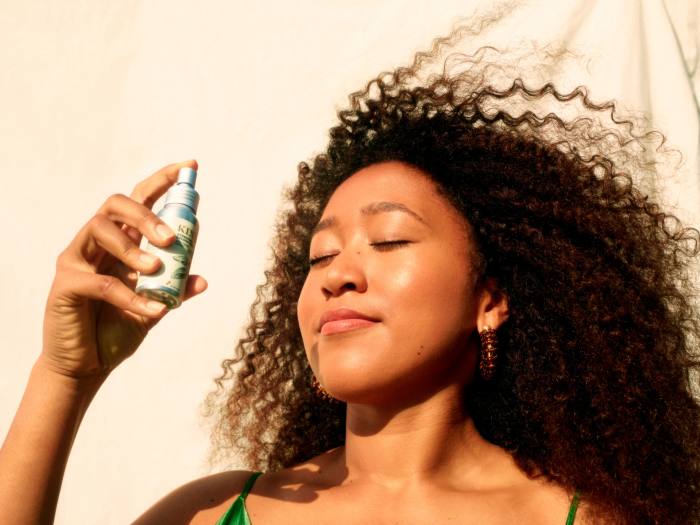
“I’m very aware of the celebrity beauty brand backlash,” says John Legend, the singer and founder of Loved01, a unisex skin and bodycare brand launched this month into US pharmacy chain CVS. “We’ve made the jokes in our marketing meetings — ‘Oh, another celebrity with a skincare brand; just what we needed’.”
Celebrities have been appearing in beauty adverts and licensing their names for fragrances for decades. But increasingly they are launching their own beauty brands and in such numbers that the category is starting to feel crowded. In the past year Brad Pitt, Hailey Bieber, Gwen Stefani, Winnie Harlow, Kim Kardashian and Jared Leto have enthused about their grasp of vinotherapy peptides, niacinamide or desert-inspired prickly pear extract as they promote products from their own skincare, haircare and colour cosmetics businesses.
Legend says he had been looking for around a decade to build a skincare brand that focuses on the needs of melanin-rich skin, which can lose moisture more quickly than skin with less melanin, and has long been associated with challenges around pigmentation. The line comes with an accessible starting price of $15 and will be rolled out in Walmart next month.
Ari Bloom is co-founder and chief executive of A-Frame, the incubator behind Legend’s Loved01. He says the recent backlash around celebrity-founded beauty brands “is because what we’re seeing now is a lot of vanity projects. Celebrities rush in to make a brand because they see Kim Kardashian doing it, and think, ‘I have a following, a big one, I can do this too!’ We say ‘no’ way more than ‘yes’.”
Bloom did, of course, say “yes” to Legend, finding in him a credible artist who wanted to use his platform in a way that had purpose, which aligns with A-Frame’s own remit to target consumers historically underserved by consumer brands. “Once we have identified a real problem, a market opportunity, and someone notable who has a high level of trust who would like to be a co-founder of the brand, then that’s when the synergy happens,” says Bloom.
A-Frame has created Kinlò with Naomi Osaka, as well as Proudly by Gabrielle Union and Dwyane Wade, both targeted at people of colour. Proudly’s baby nappies and wipes are available in more than 1,700 Target stores, while Kinlo’s suncare, aimed at melanated skin types, will soon land at 3,500 Walmart stores across the US. The company raised $11.2mn in seed funding in March.

It was Elizabeth Taylor who is credited with jump-starting the celebrity fragrance category — her 1991 White Diamonds fragrance has generated more than $1.5bn in sales for Elizabeth Arden since its launch. Avon also launched two successful celebrity fragrances around that time with Catherine Deneuve and Billy Dee Williams.
“The next real boom came in the early 2000s with J-Lo,” says Théo Spilka, global vice-president of strategic licensing and business development at Swiss fragrance company Firmenich, which has developed fragrances for Justin Bieber and One Direction. But the market became saturated and sales in the category began to slow by the end of the decade. “I knew it was over when I started getting calls from Britain’s Got Talent finalists or the Real Housewives of New Jersey wanting their own scent,” he says. “B-, C- and D-list people thought they should all be in on it too, and the retailers had had enough.”
Spilka is optimistic about the recent influx of celebrity brands in the beauty category. “Things have come back in a more managed way,” he says, “with retailers open to them selectively and this has coincided with a very strong trend in beauty companies where the celebrity will invest in the brand themselves.”
Strong exits have fuelled investor interest. Coty agreed to pay $600mn for a 51 per cent stake in Kylie Cosmetics in 2019. The Honest Company, a “natural” beauty and consumer goods brand co-founded by Jessica Alba in 2011, raised $413mn when it went public in 2021.
Damian Mould, co-founder of One Luxury Group, a strategic partner in Hailey Bieber’s skincare line Rhode, says social media has made celebrity founder brands interesting to investors again. “The concept of people with huge amounts of followers creating products for the people who follow them, is still a concept that has validation and works,” he says. “But it only makes sense with the very few influencers who have true influence with their followers and cultural capital with them.”

Social media has significantly reduced marketing costs, he adds. “Prior to the existence of influencers, I would sign a celebrity to do different campaigns, then I would have to pay three times as much to let consumers know about the campaign, taking out ads in the September issue of Vogue or doing a TV ad. You can now go to market for a third of the price — your celebrity will already have their own followers, so you can sell direct to consumer without the gatekeepers of radio, TV, print journalism.”
But problems arise when celebrities launch brands in areas in which they lack existing credibility — for example, the heavy scepticism that met Pitt and Leto’s forays into skincare last year. “It turns into a land grab, rather than something that came out of true belief, provenance, want, desire, and knowing there’s a need for it,” says Mould. One investor, who asked not to be named, told me they blame the agents for this: “Agents will slap their clients’ names on anything.”

Plenty of brands are succeeding in the category. UK beauty retailer SpaceNK, whose first celebrity brand was Kora Organics by Miranda Kerr, says it now does a brisk trade with the 11 celebrity or influencer brands it has in stock. When singer Selena Gomez launched Rare Beauty, a three-year-old cosmetics line with a strong commitment to positivity around mental health, in the UK last year, the customer waiting list stretched to 18,000. Industry sources estimate it generates $50mn-$100mn in sales annually.
“Founders have always been a core pillar of a successful brand,” says Margaret Mitchell, chief commercial officer at SpaceNK. “Having a pre-existing audience shouldn’t be a reason to launch a brand, but nor should it preclude people from launching beauty brands. It’s about the founder as an individual, bringing a new perspective to beauty that resonates with consumers in an already crowded space.”
That is not always evident at traditional heritage brands. As Mould says: “Celebrity brands often get unjust kicks over and over because it’s good click bait. But what’s the alternative? Do you want a faceless conglomerate to do it, or do you want someone you have an affinity with?”
Find out about our latest stories first — follow @financialtimesfashion on Instagram
Stay connected with us on social media platform for instant update click here to join our Twitter, & Facebook
We are now on Telegram. Click here to join our channel (@TechiUpdate) and stay updated with the latest Technology headlines.
For all the latest Fashion News Click Here
